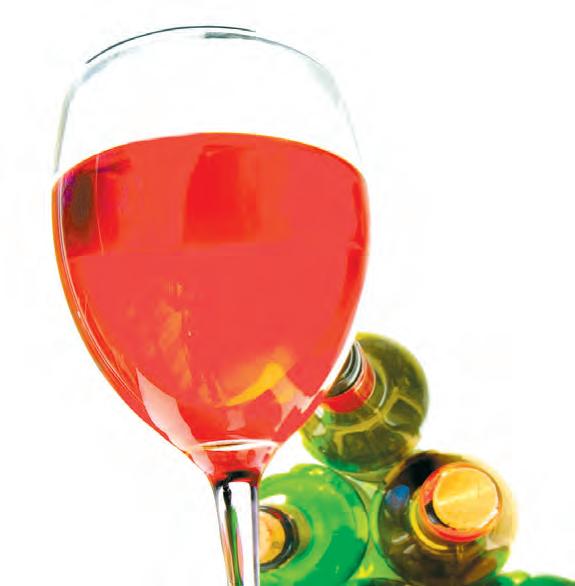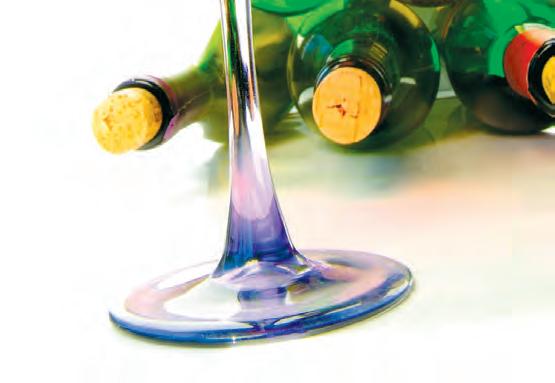
3 minute read
The Wine Girl by Elyse Genderson

DISCOVERING MEXICO’S SMOKEY SIDE

A Taste of Mezcal
by Elyse Genderson
Mezcal’s popularity has no signs of slowing down. This category has enjoyed tremendous growth over the past 10 years and continues to climb. What’s considered trendy and current here in DC has a long history dating back over 500 years in Mexico.
Mezcal is an overarching term for all agavebased spirits (of which there are many), much in the same way as Cognac is a regional classi cation for Brandy. Tequila is actually a type of Mezcal.
The major di erences between Mezcal and Tequila are that Mezcal can come from anywhere in Mexico (but is most commonly from the state of Oaxaca) and Tequila must come from the Tequila area in the state of Jalisco. Both distillates are sourced from the agave plant, but Mezcal can be made from about 30 varieties of agave, while tequila can legally only be made from the “Weber Azul” or “Blue Agave” plant. Mezcal is mostly made from the Espadin variety (accounting for over 80% of production), but other important varieties include Tobalá, Arroqueño, and Tepeztate. Some varieties can take up to 30 years to mature, most take about 10 years, adding to the cost of production.
The speci c place where they’re grown, the soil type, the microclimate, the traditions of the distiller and grower, and the variety of agave all contribute to the unique avor in your glass. Much like wine, Mezcal is a drink capable of expressing terroir.
Another key di erence between Mezcal and Tequila is the avor. Mezcal is renowned for its signature smoky character derived from smoking the heart of the agave called the piña in underground pits called “palenques,” for about 3 days before fermentation and distillation. Whereas Tequila is slowly roasted or steamed in stone ovens above ground.
The smoked piñas are then crushed by a large stone wheel, sometimes still pulled by livestock, and then fermented in large barrels. Once fermented the liquid is distilled twice in small copper pot stills. Producers making Mezcal on a larger scale will use industrial mechanized crushers, but the ancient techniques are still used by heritage distillers. Both Tequila and Mezcal have been made in almost the same way for hundreds of years by artisanal producers.

Top Producers to Try:
Yuu Baal is a 100% Mexican-owned company with the goal of promoting the rich traditions of native Oaxacan producers of Mezcal. Grupo Yuu Baal is made up of quality producers in several regions including San Juan del Rio, San Luis del Rio, Tlacolula, and Miahuatlan, Oaxaca. Each of these artisans produces outstanding, complex Mezcals from the best heritage varietals expressing the unique terroir of their village. Artisans are involved in every step of the production process including planting, cutting, and distillation. All of these steps are done by hand, with respect for the environment.
Yuu Baal Pechuga Mezcal $59.99:
Powerful aromas of smoke, orange peel, anise, pineapple and mango are lifted by green herbs. The texture is velvety with bold honey, citrus, saline, and spice avors on the palate. A turkey breast is hung over the still during the last distillation to impart more complexity.
Yuu Baal Joven Espadin Mezcal $59.99:
Soft and elegant smoke avors are balanced by exotic mango, peach, and orange. Full of weight and a round, rich texture.
Yuu Baal Reposado Espadin Mezcal $59.99:
Pale golden-yellow in color, full bodied, the elevated production process and longer standards of aging, ensure the utmost quality and complexity. Aged six months in American White Oak.
the wine girl
Yuu Baal Anejo Espadin Mezcal $59.99
Aged for 12 months in White American Oak for an especially deep golden color and full body. Pronounced fruity, honey-agave aromas and avors of charred oak and dried tropical fruits.
Yuu Baal Joven Tepeztate Mezcal $119.99
A unique mezcal with an herbal note of anise, dried cilantro and mint, orange, lime, and wild blossoms. An elegant touch of sweetness follows on the long nish.
El Buho Mezcal Tobala $89.99
Elegant smoke, tropical fruit avors are enhanced by caramelized pineapple, sea salt and buttered popcorn notes.
Elyse Genderson is the Vice President of Schneider’s of Capitol Hill. Visit her at the historic storefront at 300 Massachusetts Ave NE to discover wines you’ll love. ◆










